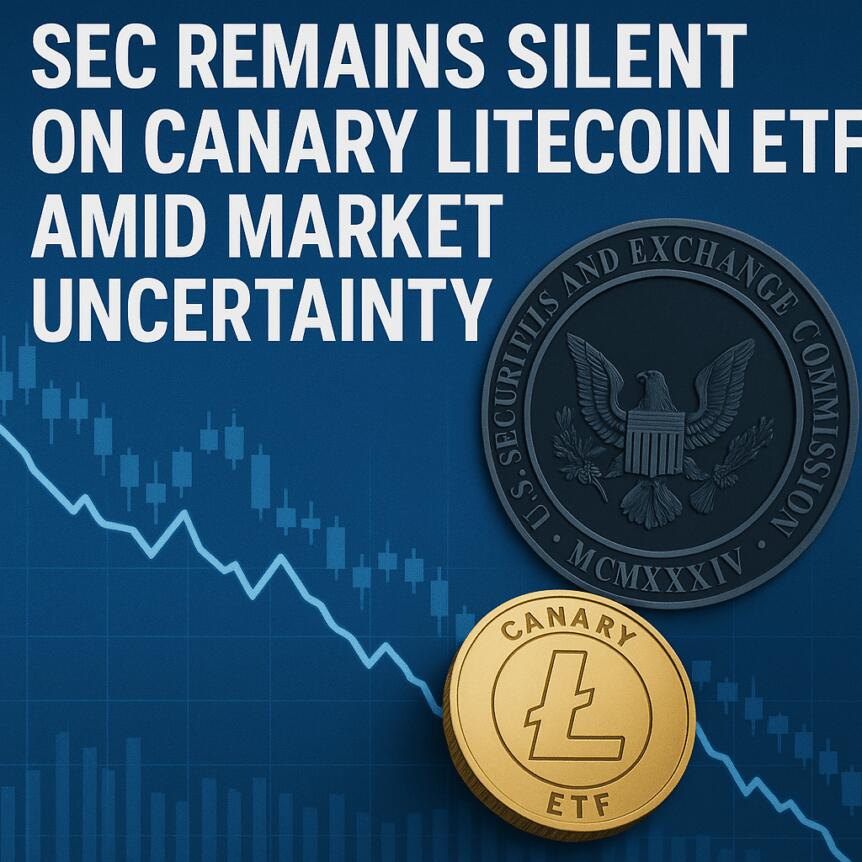- The SEC has not acted on Canary Capital’s spot Litecoin ETF application by the deadline amidst a looming government shutdown.
- The regulator’s silence coincides with new generic listing standards that could alter ETF approval timelines.
- Canary withdrew its 19b-4 application last week, complicating the approval process for similar entries.
- The SEC will operate in a limited capacity during the shutdown, affecting its review process for crypto ETFs.
- The U.S. market anticipates approvals for more spot crypto ETFs, including Bitcoin, Ethereum, and altcoins, amid evolving regulatory standards.
Regulatory uncertainty continues to cast a shadow over the future of cryptocurrency exchange-traded funds (ETFs) in the United States. The U.S. Securities and Exchange Commission (SEC) recently announced it would take no action on Canary Capital’s spot Litecoin ETF application by the set deadline, leaving the crypto community in suspense. This pause comes amid the backdrop of a possible federal government shutdown, which could significantly impact the SEC’s operational capacity and decision-making process.
The SEC’s silence has fueled speculation about the agency’s future approach. Prior to this, Bloomberg ETF analyst James Seyffart and FOX News reporter Eleanor Terrett highlighted that the old 19b-4 deadlines for crypto ETF applications might be irrelevant now, as the SEC requested applicants to withdraw them, focusing instead on the S-1 registration process.
Adding complexity to the situation, the SEC has previously indicated that it would operate with a limited staff during the shutdown. Although its EDGAR database remains accessible for filings, the review process for new applications — especially complex ones like digital asset ETFs — will likely be slowed or halted.
Canary’s withdrawal and regulatory shifts impact the ETF landscape
Canary withdrew its 19b-4 application on September 25 at the SEC’s request, which could explain the agency’s hesitation to render a decision. The move complicates the approval process for other issuers still holding similar applications, as it raises questions about the relevance of the 19b-4 filings in the current regulatory framework.
— Litecoin (@litecoin) October 2, 2025
Efforts to clarify the SEC’s stance continue, but official statements remain scarce. Cointelegraph contacted both the SEC and Canary for comments but did not receive immediate responses, underscoring the opacity of the current regulatory environment.
Limited SEC operations and the future of spot crypto ETFs in the US
In anticipation of the shutdown, the SEC affirmed it would continue limited operations, with core functions like the EDGAR database remaining accessible. Nevertheless, the agency’s capacity to review and approve new crypto ETF proposals will be significantly constrained, potentially delaying approvals for several expected spot market products.
Growth prospects for altcoins in the US crypto ETF market
The U.S. market is closely watching for approvals of additional spot ETFs covering various cryptocurrencies, including Litecoin (LTC), Solana (SOL), XRP, Avalanche (AVAX), Cardano (ADA), Chainlink (LINK), and Dogecoin (DOGE). The approval of these would expand the existing US crypto ETF market, which already boasts over $75 billion in assets, mainly from Bitcoin and Ethereum ETFs.
Analysts believe new listing standards introduced recently could accelerate approvals, with Bloomberg ETF analyst Eric Balchunas citing a potential 100% chance of some spot crypto ETFs launching soon, thanks to streamlined procedures under Rule 6c-11. SEC Chair Paul Atkins has also emphasized that these standards aim to reduce barriers and enhance investor access to digital asset products.
As regulatory developments unfold, the future of spot crypto ETFs in the US remains a key focal point for both institutional and retail investors, shaping the trajectory of cryptocurrency markets and broader adoption of blockchain-based financial products.







